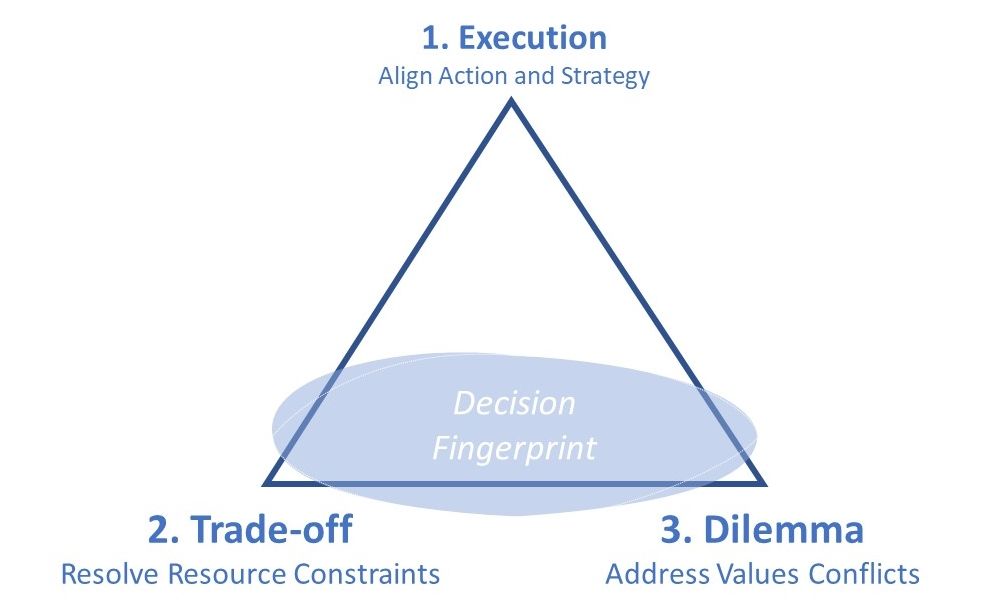Executive decision-making: The 3 types of decision top leaders get right
By Ken Thompson, Feb 27, 2021 Last updated Jun 11, 2025
As a leader there are 3 types of decision which you must get right most of the time. No leader gets them right all the time, but if you are getting more right than you are getting wrong you will be performing strongly as a leader!
Think of flying out with your family on holiday.
99% of the captain’s decisions could equally well be made and executed by a newly qualified pilot (or autopilot). However, it’s the other 1% (extreme weather, passenger incidents, crew illness, unexpected diversions and other emergencies) which can be FiW (fatal if wrong) which justify the extra cost of having a highly experienced pilot in charge. That’s where the captain earns the big bucks – the 1%, not the 99%!
3 types of FiW decision
The three "FiW" types of decision are:
- Execution decisions
- Trade-off decisions
- Dilemma decisions
Type 1 – Execution decisions
This is about ensuring your actions align with your chosen strategy. It’s such a big problem in organisations it has its own name – “the execution problem”. Many books have been written on this single topic. It is true that a poor strategy is a bad decision, but it may do little organisational damage as it may often be operationally ignored in practice! However, the poor implementation of a good strategy represents either a major problem or a missed opportunity to an organisation.
Type 2 – Trade-off decisions
All leaders have finite resources (people, money, assets, customers, channels, partners, goodwill, reputation, access and relationships) at their disposal. A resource trade-off is where you want to do two things at the same time but do not have sufficient resources. So you have to make a choice – a trade-off. A weak leader often denies the reality of the trade-off and tries to do both things anyway. Here’s a great example – market share and profit in a business. New customers enhance market share but may not be as profitable as existing loyal customers. This may not matter in a buoyant market. However, in a depressed market a good leader may have to make a straight choice of where to put their sales and marketing investments. Will it be market share or profit?
Type 3 – Dilemma decisions
A dilemma decision is also a trade-off but between values rather than resources. Here’s an example – imagine a cruise ship – a central dilemma is between guest satisfaction and crew morale. Often crew morale gets sacrificed to address unexpected issues in guest satisfaction. This results in leaders accumulating debts – in this case you are now in debt to crew morale. Good leaders repay these debts as quickly as possible – weak leaders build up “bad debts” in certain values which eventually come back in a way which can be no longer ignored and can have serious consequences.
FiW decisions often have composite “fingerprints”
Life would be a lot simpler as a leader if each of our critical decisions fitted neatly into one category or another. Sadly, it does not usually work out like that.
The figure below shows each type of decision as a corner of a triangle which you can map a particular decision onto.

For example, that cruise ship values trade-off example might also have a resource trade-off rolled into it around how you deploy already over-stretched members of crew on this issue.
FiW decisions may involve multiple stakeholders
Another factor which can make these decisions tricky is that there can be many stakeholders – each with their own view on what is right from their perspective.
Typical stakeholders include:
- Senior leaders (whose departments will be impacted by the decision)
- Members of your own leadership team (each with different perspectives, priorities and backgrounds)
- Functional heads (with potentially conflicting goals such as sales versus production)
Practising FiW decision-making
Facilitated team-based business simulations can be a very efficient and effective way to improve critical decision-making skills as leaders (and emerging leaders) encounter realistic business scenarios in an environment which have no consequences if got wrong – definitely not FiW!
Playing the simulations in teams allows for the multi-stakeholder aspect of these decisions to be experienced with each team reporting to a "CEO in the sim" and team members playing different team roles with conflict already baked into their functional objectives.
Each of our portfolio of business simulations addresses all 3 types of decision – this is by design and reflects the real world. However, different simulations bring different emphases.
For example, our business strategy/acumen simulations such as Acumen tend to major slightly more on execution decisions, whereas our team leadership simulations such as Crew emphasise trade-off decisions a bit more and our business leadership simulations such as Dilemma tend to slightly prioritise dilemma decisions.
However, the bottom line is your performance as a leader will be limited by your weakest decision-making skill. Do you know what it is? That is the vital first step in developing mastery of "fatal if wrong" leadership decisions.
